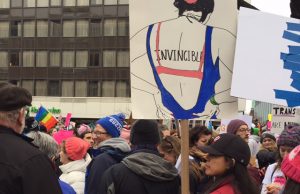On Refusal, Privilege, and the Calcifying of the Soul
By Jason Craige Harris
I am Other. When I come knocking at the door of your soul, you may refuse me, but not without consequence. When I come with arms outstretched, you may turn me away, but not without self-injury. You may, through negligence, fear, and hatred, misrecognize me as an enemy, but not without violating your soul’s integrity. You may exclude me, but not without compromising your spiritual health. You may endorse the inhumanity of unwelcome, of soul closure, and justify the violence it causes, but not without courting the death of us all. When you wound me, you wound yourself; when you fail to see in me the same Spirit Breath that inhabits your being, you imperil your own divinity. I am the condition of your soul’s flourishing. Rejecting me might bring you social rewards, but it won’t bring you Life.
And that is the truth that privilege works so hard to conceal: 1) injustice in whatever form relies on the curtailing of the soul; 2) the soul is not meant to be so circumscribed—it needs no border patrol, no selective guest list; 3) ossifying the soul naturally leads to social evil; and 4) one cannot collude with such evil and walk away unscathed. Before you ever annihilate the Other, you must first alienate her; you must buy into the colonial lie that she is not in some sense you. You must shrink the soul, limiting its capacity to embrace her. And you cannot do so without betraying Life, without declaring war on your own being. Erecting harsh boundaries around the soul doesn’t save; it damns. Privilege calcifies the souls of those who don’t interrogate it, who deny the sacredness of soul hospitality.
For those who benefit, maintaining privilege is easy yet appears to involve a fair amount of work. One must, through repetition, socialize oneself into a parochial altruism, into a denial that desensitizes, a refusal that fortifies against empathy, which incessantly gnaws at one’s moral fiber. Privilege is practice. Look away. Close your eyes. Refuse to listen. Enclose yourself so as not even to hear. Make excuses. On the one hand justify, on the other hand delegitimize. Encase yourself in comfortable, self-securing ideologies. Sharply delineate yourself; live as discretely as possible. Reject expansive connectedness; support only those who resemble you, and only when you perceive it to be most self-serving. Abandon moral responsibility to Other; deny that you’re made of the same stuff, that matter matters; imagine that your fate isn’t intertwined with theirs, that of those people, over there, or right here. Your psychological and emotional cocoons will leave you feeling virtuous, satisfied, all the while shielding you from the harm you (perhaps) inadvertently cause, all the while shelving your humanity. Cocoons of this sort are demanding, costly even. You may indeed gain the whole world, but you will lose your soul. You will become a toxic brew of self-justified selfishness and entitlement wrapped in bitterness, which will extinguish the light within. Your cocoons will stifle your creativity, make your soul callous, and rob you of the beauty and wonder of ever-widening soul embrace.
Uninterrogated privilege is little more than structured and structural refusal of Other. Insofar as we, whether as individuals or collectives, participate in it, we are complicit in the wounding of our own souls. Precisely because its movement is always increasingly insular, individualistic, and isolationistic, uninterrogated privilege drains the soul of compassion, which is the soul’s animating force. This is how one can come to stare Other’s suffering in the face, and appear to be wholly unaffected. The soul’s vitality is directly connected to its degree of empathy. However, privilege would have us believe that we cannot afford the soul’s porosity, that openness to Other threatens our existence rather than grounds it. But what if we cannot afford not to welcome? What if everything depends on it?
Privilege is a factory of lies, of delusions that die slowly. Here is what is true. Daily we are faced with a pressing ethical challenge, posed to us by the very presence of Other in our midst: Will you make room in your soul for me? Will you banish or welcome me? Will you acknowledge our oneness? Will our difference be cause for celebration or rejection? Will you embrace me and thereby more fully embrace yourself? Or will you give in to the temptation of soul nativism? Of psycho-spiritual hardening? Of the militarism of the soul? Of secured borders? Will you allow your defense mechanisms to determine how you relate to me? Or will you refuse the refusal on which privilege relies? Will you engage in a politics of counter-refusal, of radical soul welcome?
The health of the soul is inversely related to the frequency with which it constricts—the more it constricts, the less healthy it becomes. Oxygen and blood are for the heart, what empathy and relationality are for the soul; the heart cannot survive without its integral elements and neither can the soul. When the soul embraces rather than refuses Other, it secures its own flourishing. However, when the soul denies entrance to Other, it denies the very condition of its own survival—indeed, it denies Life itself. With each refusal, the soul hardens, lining itself with callus ironically in the name of self-protection. In so doing, it unwisely denies the medicinal properties of welcome. The very thing that could heal it is also that which it finds most threatening, that by which it is most repulsed. This is a pathological and delusional spirituality that denies shared humanity, that refuses to welcome Other into and as already part of oneself, that says, “I am not you, and therefore I do not need you.”
Given that soul survival rests on soul welcoming, one might think it baffling that we should daily awake to a world so often given over to misanthropy, so often ensnared by the failure to be hospitable and to welcome capaciously. “How has our species managed to survive this long?” we might wonder, and with good reason. A deeper and more urgent question, however, is, “How much longer?” How much longer will it be before soul calcification leads to species extinction and planetary demise?
Our streets already overflow with proof that the soul’s hardening fosters brutality and extinguishes light. The results are so clearly lethal. If you refuse Other at the door of your soul, you will treat him as excess, as disposable waste. You will exclude him from your ethical circle and deny him representation in your court of empathy. You will criminalize his breath, declaring him unworthy of life. If you refuse Other at the door of your soul, then you will exile her on the trivial grounds of race, nation, religion, sexuality, class, ability, and gender. The systems of power you support will seek to render her existence a mere negotiation between them. When you excise Other from your soul, genocide, in all its forms and whatever its speed, will increasingly seem reasonable. But the calculus of this death-dealing system will eventually yield an algorithm of self-destruction. It is a law of the universe. You may stand your ground, unnecessarily, but your soul will retreat. And one day you’ll wake up to a world too polluted for you to breathe, too committed to violence to notice your suffering, and you’ll wonder what happened. You will have found yourself exiled from another’s soul. Negated. Detritus.
The fossilization of the soul is a matter of the everyday, of the gradual retracting of the soul’s edges, moment by moment, with every unethical, anti-relational choice. It becomes institutionalized through routine practices of denial, dissociation, and disavowal. Insofar as these practices instruct, habituate, and self-perpetuate, they constitute a pedagogy of callousness. This is why we need a counter-pedagogy of soul welcome, of what some call an ethic of love, rooted in the everyday.
This ethic of love ought to provoke in us rigorous self-examination. Daily, we must ask ourselves very difficult questions about the composition and status of our souls. To whom have we restricted access? Whose presence have we imaginatively vanquished? Whom have we forgotten? Whom have we made invisible? From whose suffering have we shielded ourselves? To whose cries have we become desensitized? Whose voices must we let in for our ethical witness to be credible and our soul truly capacious? As we answer these questions we can come to terms with what it means to widen the terrain of the soul: the labor, the discomfort, the humility, the vulnerability. We can choose to listen closely to stories that, while often told, have not often been heard. Listening, truly listening, is the beginning of empathy. It is to sit with a voice we do not immediately recognize as our own. This is a practice of everyday soul welcome, of de-centering the self precisely when we are least inclined. Compassion removes callus. Opens the soul. Oxygenates it. Re-sensitizes it. Enlarges it. Heals it. And heals our world.
________________________________________________________
 An educator, writer, and minister, Jason Craige Harris has expertise in religion, ethics, literature, and theory. He is the writing instructor at Friends Seminary (NYC) and the Strategic Operations Leader at Postcolonial Networks.
An educator, writer, and minister, Jason Craige Harris has expertise in religion, ethics, literature, and theory. He is the writing instructor at Friends Seminary (NYC) and the Strategic Operations Leader at Postcolonial Networks.




0 comments